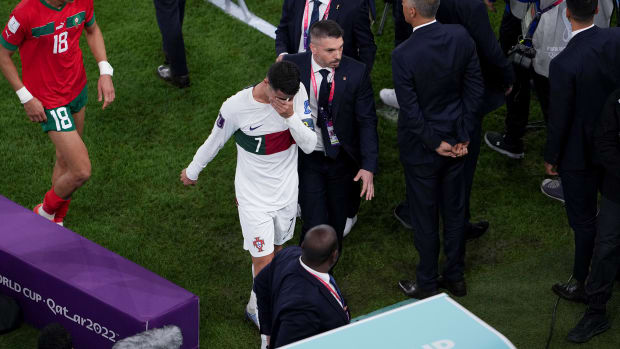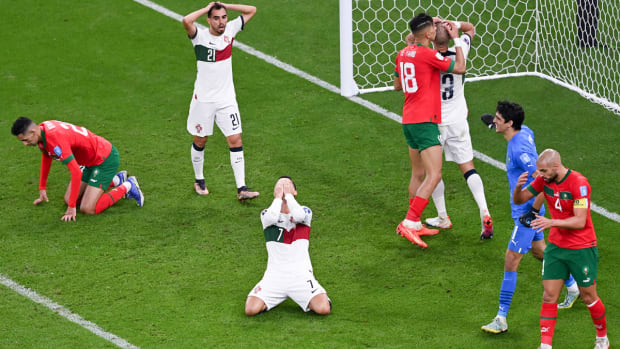Cristiano Ronaldo left the pitch at the final whistle after Portugal’s 1–0 defeat to Morocco in Saturday’s World Cup quarterfinal and headed straight down the tunnel, weeping. How you viewed that probably depends much on how you see Ronaldo.
On the one hand, of course, it was petulant and self-centered. His own sense of self-pity outweighed any sense that his team, his country, might be feeling disappointment. After he had made such a point of saluting the Portugal fans after the 6–1 win over Switzerland in the round of 16, here perhaps was a truer reflection of where they stand in his priorities. There was no dignity in defeat, no feeling he might go and congratulate the victorious Moroccans, or wish them well for the semifinal—the first African team to reach such a milestone. It was graceless in the extreme.
But on the other hand there was something sad about the spectacle. Ronaldo, now 37, has been one of the greatest players in the world over the past two decades. His powers are waning. He is struggling to accept that he, too, is subject to the process of aging. He has evolved his game as mobility has deserted him, transitioning from willowy winger to dynamic inside forward to old-fashioned center forward. But there is nowhere else for his evolution to go. His explosive pace has left him. His leap is not what it was. He doesn’t even finish with the same regularity he once did.

Zheng Huansong/Xinhua/Imago Images
Each passing month brings new humiliation. In the summer, he tried to leave Manchester United, only to find that no club of the requisite size wanted him. He said no to a Saudi Arabian side then; now it appears he has no other choice. At Man United, manager Erik ten Hag quickly decided he didn’t want him. Ronaldo has been a bit-part player in the Premier League.
With Portugal, there has been grumbling for some time that Ronaldo’s presence was holding back the great generation of creative talent behind him: João Félix, Bernardo Silva, Bruno Fernandes, Rafael Leão—the list goes on. But Fernando Santos, who had coached him at Sporting, never seemed inclined to leave him out until he was riled by Ronaldo’s reaction to being substituted against South Korea in the group stage.
But for Ronaldo, every substitution is a step nearer the end he clearly dreads. Every minute on the pitch is a further opportunity to score, to rack up his personal records (he may be the only male player to score in five World Cups, but he still has not scored a single goal in the knockout stage). Ronaldo was dropped for the last-16 match against Switzerland and saw his replacement, Gonçalo Ramos, score a hat trick as Portugal suddenly looked the fluent attacking team the players suggested they could be.
Ronaldo smiled in the right places, applauded when he needed to, but there was then talk, denied by the Portugal camp, that he had wanted to leave the World Cup altogether due to his role reduction. He was left out of the starting lineup again for the quarterfinal, reduced to a reserve. This time, though, Ramos was isolated and crowded out, making barely any impact. With a certain inevitability, Santos turned to Ronaldo six minutes into the second half.

Li Jundong/Imago Images
This was his chance for redemption—and nothing came. Ronaldo could not change the shape or passage of the game. He was impotent, just as isolated and crowded out as Ramos had been, imprecise or lacking his usual polish when the odd chance to score did materialize. Being isolated and crowded out is perhaps what he does best these days. The will is there, the ability not.
All people must go through this, of course, the little signs that age is catching up with us: the bus number we can no longer read without glasses, the chair we can no longer get out of without a sigh, the Thursday night five-a-side that becomes too painful. Mature adults deal with it. But Ronaldo’s loss is greater; he defined himself by his physical prowess, and now his body is betraying him.
And he is not mature. His egocentrism is what once made him great, gave him the belief to work and work and work to become the footballer he became. Now, it exposes him to ridicule. He is somebody who has been revered all his adult life. Even against Switzerland, with Portugal 4–1 up, a portion of the crowd demanded he be brought on, chanting his name in unison. How must that skew the perspective. He has been indulged all his life and is having to face up to the prospect of leaving the highest level of the game, falling short of winning the one title that has evaded him. Whatever records he sets in the Saudi league, should that be where he goes for an exorbitant salary, there is a profound sense of anti-climax. There is a tragedy in that, of sorts.
It is possible to have sympathy for him about that, while at the same time recognizing that if everybody behaved like that, sport would be unbearable—that the mark of a true sportsman is to act well despite it all.







